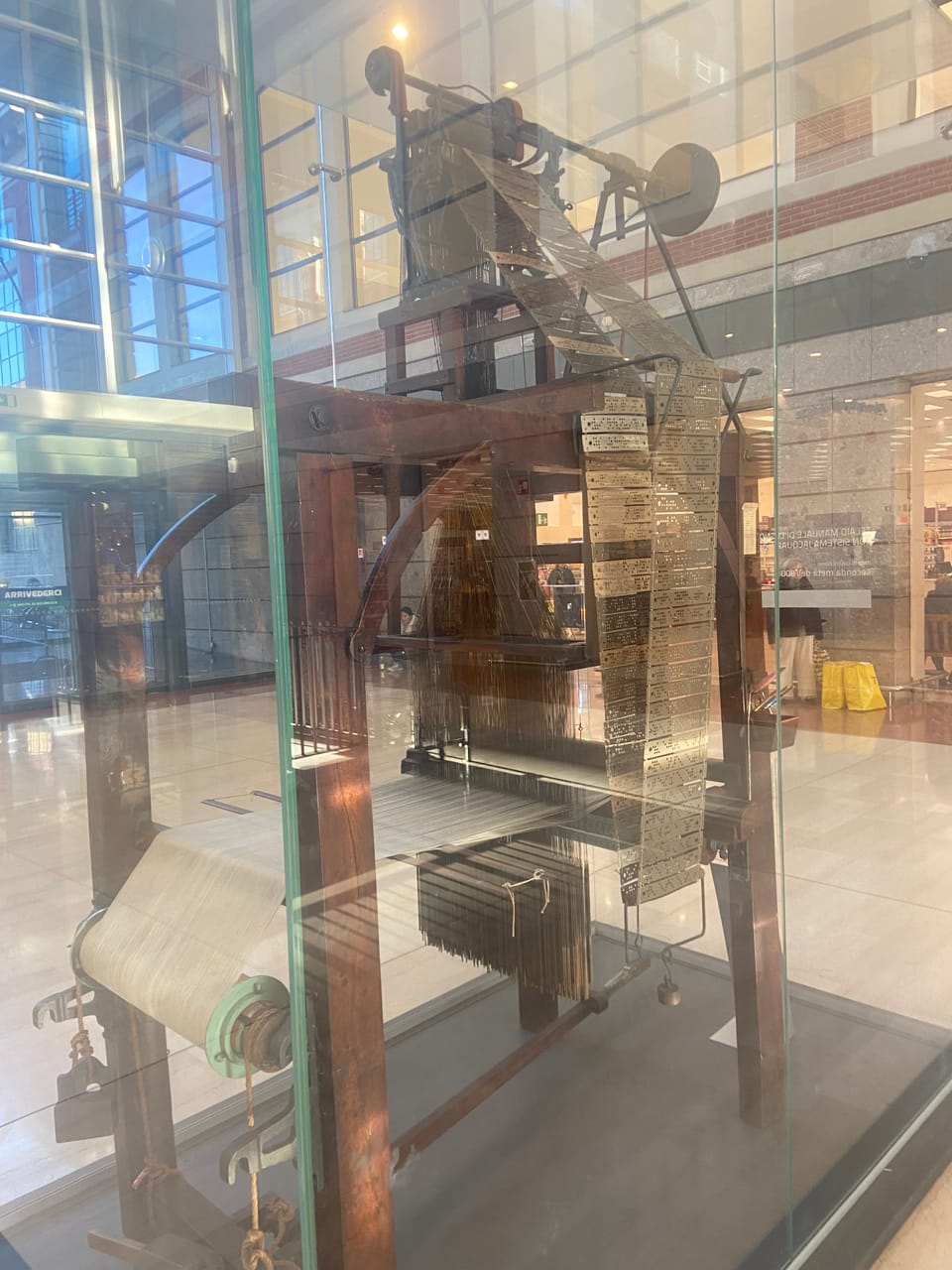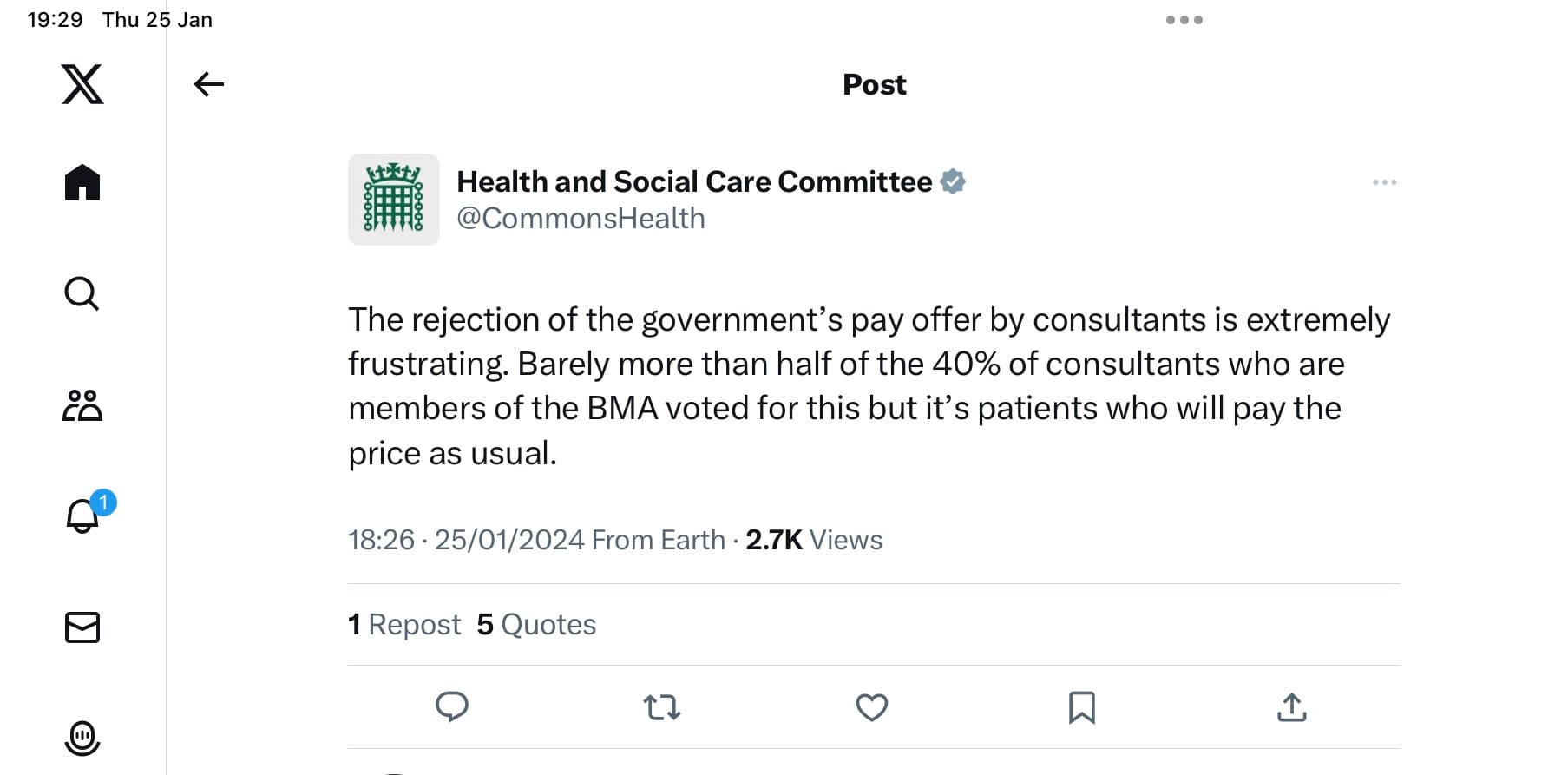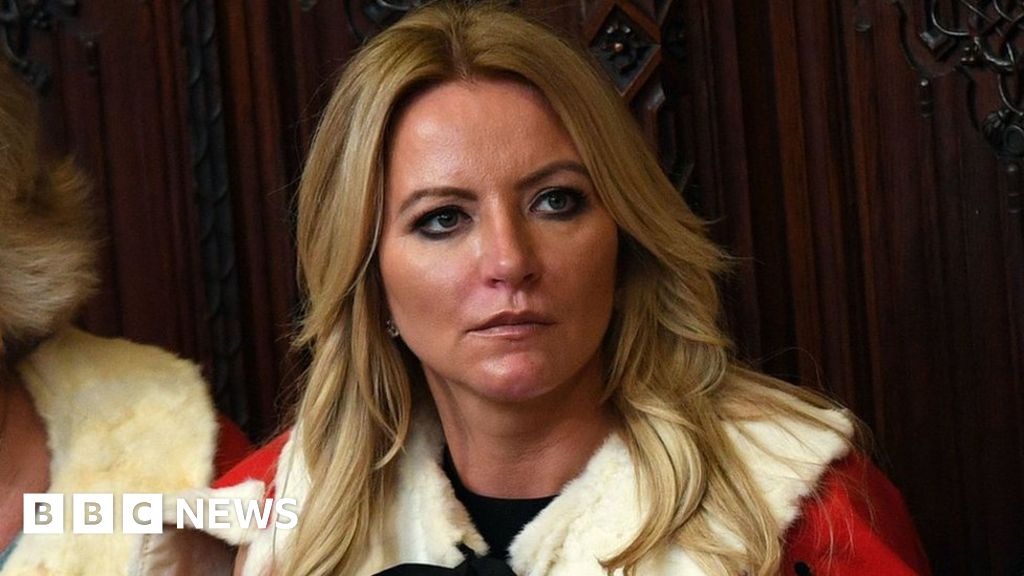Cowper’s Cut 307: Mirror, mirror - reflecting on the Sunak Cost Fallacy

More NHS industrial action over pay and conditions lies ahead of us.
The question now is of what form it will take.
Pay deal narrowly rejected at 51% no.
— Mike Henley 🤨 (@trentconsultant) January 25, 2024
The BMA consultants’ vote rejected the deal by a slim majority of 51% (with 49% voting to accept it), on a 64% turnout.
This is almost a banter outcome: perilously close to the 52:48 majority in the Brexit advisory referendum.
Still, none of us can doubt that PM Rishi ‘The Brand’ Sunak and Health But Social Care Secretary For The Time Being Victoria Atkins will respect the BMA consultants’ wafer-thin majority as giving them a clear mandate: an absolute right to take unspecified but major unilateral action.
That’s how these things work, right?

Given the slender margin and relatively low turnout of the vote, the consultants committee announced that “we have decided not to call strike action at the current time but instead enter discussions with Government to see whether we can secure improvement to address our members' concerns.
“If, however, that is unsuccessful, consultants in England remain in dispute; as members demonstrated in the ballot before Christmas they remain committed to taking further strike action, should the need arise.
“We want this dispute resolved, but the ball is in the Government’s court to make a renewed offer that not only delivers for consultants, but crucially, for patients too, by retaining the NHS’s most experienced clinicians”.
— Victoria Atkins (@VictoriaAtkins) January 25, 2024
Health But Social Care Secretary Atkins’ response is straight out of the headteacher drawer: she’s not angry, just “disappointed that after weeks of constructive negotiations the BMA has, by the narrowest of margins, rejected this fair and reasonable offer”. One must have a heart of stone not to laugh.
It turns out that my prediction last week somewhat over-weighted recent anecdotal and visible discontent. When voting on the consultants’ deal first opened in December 2023, I wrote that “I think there is a reasonable chance of the deal being rejected, but the margin may not be huge”.
Last week, I updated this to “my sense today is that BMA consultants will reject this deal, and that the margin of their vote may not be small”.
So I was right both times, but I was more right the first time.
It’s a funny thing, making predictions: I never do it, and I never will.
Mirror, mirror: Atkins asks junior doctors’ leaders to reflect
‘Mirror, mirror on the wall: who is the PR-est of them all?’
Is SOS Atkins the Dollar of health secretaries?
“I very much hope they’ve had time to reflect and they're able to come back with reasonable expectations”
— Peston (@itvpeston) January 24, 2024
Health Sec @VictoriaAtkins says junior doctors' “unreasonable demands” are stopping a pay deal being agreed
Watch tonight ⬇️
💻 LIVE 9PM @itvpeston
📺 1045PM @ITV#Peston pic.twitter.com/eAXP6WyAar
It seems that Mrs Atkins’ New Year’s Resolution is to use less emollients.
Sorry, less emollience: her statement about the junior doctors’ industrial action to ITV’s Robert Peston Show talked of their “unreasonable demands … I very much hope they’ve had time to reflect and they’re able to come back with reasonable expectations”.
Well, it’s a point of view.

Albeit one that contrasts with her December 2023 statement to The Times that “I’m entering these discussions with a constructive frame of mind with them as it’s building a new relationship. They are representing their members. Of course I respect junior doctors. I have admiration for our doctors but also nurses and our volunteers.” Clearly, a month is a long time in Mrs Atkins’ politics.
A re-ballot of junior doctors in England will take place from 7 February to 20 March to extend our mandate for strike action, and provide us with a mandate for action short of strike (ASOS).
— Junior Doctors (@BMA_JuniorDocs) January 24, 2024
Vote
❌ YES for strikes
❌ YES for ASOShttps://t.co/W4wO1ko7QP pic.twitter.com/hJ1iiF0Dj1
To the considerable surprise of absolutely no-one, the BMA Junior Doctors Committee announced that they will re-ballot members on a mandate for continuing their industrial action beyond the current term.
Intriguingly, it will also seek a mandate for ASOS: not the cheap fast-fashion online retailer, but action short of striking. Voting will take place from 7 February to 20 March.
Hobson’s Choice of more negotiations
The politics of the ongoing dispute are terrible for the Government.
“We’ve obviously been hindered by industrial action”
— BBC Politics (@BBCPolitics) January 7, 2024
Prime Minister Rishi Sunak suggests that strikes in the NHS are partly responsible for the fact that overall waiting lists are still going up#BBCLauraK https://t.co/k5EJXrjKyD pic.twitter.com/WZpT9xTOhR
PM Sunak has been going around claiming that they had fixed a deal here, telling the BBC Laura Kuenssberg Show that “the Government has reached a resolution with every other part of the NHS workforce other than junior doctors”.
This has now been shown to be an untruth.
The Government would evidently like to have an option that let them avoid the inevitability of further negotiations with both the consultants and junior doctors. Alas, here in The Real World, there isn’t one.
This political reality is unlikely to stop the Government trying to avoid new talks and improved offers, which will needlessly draw the dispute out across potentially much of the remainder of the winter period.
The PM was also blaming the strikes for the failure to hit his pledge on the NHS backlog. This is also going to look terrible, because …
It’s not going very well, and there are no strikes to blame
The latest NHS England winter sitrep data covers the period with no industrial action. So everything has snapped seamlessly back to the usual pre-strike perfection of performance and safety, right?
Wrong.
- There was an average of 1,582 patients in hospital with flu each day last week, up 11.7% from 1,416 the previous week, meaning a second peak for flu (having been 1,548 a fortnight earlier).
- The proportion of ambulance handover delays of more than 30 minutes was 32.2%, up from 25.7% the previous week, and above the 20.2% reported during the same week last year.
- An average of 47,468 NHS staff were off sick last week, down 3.2% from 49,039 the previous week.
- Some 14,436 beds each day were filled with patients no longer meeting the criteria to reside in hospital on average last week, up 5.9% from 13,637 the previous week. At the same time last year this was 13,566.
- 103,277 beds were available on an average day last week, up by around 1.8% year-on-year (101,473), with bed occupancy at 94.3% compared to 93.8% the same time last year. Adult general and acute bed occupancy is as high as 95.7%.
You can look at the multiple examples of NHS organisations announcing they are on divert, or Black Alert (or Opel 4, if you like that sort of thing) that the Sunday Times’ Shaun Lintern has curated on his Kiss timeline.
It is absolute chaos in far too many places right now.
Where do the parties go next?
The BMA consultants leaders have been smart to seek fresh talks. Their mandate for going directly to more strikes would look weak because of the slender margin against the deal.
The position for the Government is much more challenging. The evident failure of PM Sunak’s attempts to present this as a ‘done deal’ (whether motivated by an attempt to bounce it into being one, or simply because the PM has found that obviously lying has few immediate costs with as lazy and supine a media as the UK’s) makes them look silly. It’s difficult to be sure whether the Government are in fact bright enough to see how dim it makes them appear. We might call it the Sunak Cost Fallacy.
I would expect the Government to do nothing for a period. It is, after all, what they have done with the junior doctors’ leaders once the strikes ended.
In terms of this Government’s political priorities, their revealed preferences shows us that the NHS is a long, long way down their list. Indeed, the current Government’s attitudes to the politics and policy of the NHS reminds me of erstwhile replacement US president Lyndon B Johnson’s famous comment that “making a speech on economics is a lot like pissing down your leg. It may seem hot to you, but it never does to anyone else”.
Kiss stupidity I: Health Select Committee chair Steve Brine on the industrial action
Yeah, I know: writing about health policy/political stupidity on Kiss (formerly Twitter) may make this a loooooooong issue of ‘Cut’.
So it goes. Health Select Committee chair Steve Brine MP hasn’t been too egregious an idiot hitherto, but managed to foul up royally on Kiss when the consultants’ vote on the offered deal was announced.
Brine used the official Commons Health Kiss account to state the following:

Brine amended this quickly to the following: “The rejection of the government’s pay offer by consultants is extremely frustrating. Barely more than half of the 40% of consultants who are members of the BMA voted for this but it’s patients who will pay the price as usual. We urgently need both sides round the table. [SB]”
The rejection of the government’s pay offer by consultants is extremely frustrating. Barely more than half of the 40% of consultants who are members of the BMA voted for this but it’s patients who will pay the price as usual. We urgently need both sides round the table. [SB]
— Health and Social Care Committee (@CommonsHealth) January 25, 2024
Adding Brine’s initials to the comment did not make his authorship sufficiently clear to the median Kiss reader; nor did it justify his use of the official Commons committee Kiss account to make a nakedly party-political statement. (The official Department For Health But Social Care Kiss account has also been repeatedly guilty of this, for several years.)
Mr Brine has his own Kiss account to share his own views.
Kiss stupidity II: SOS Atkins on The New (If Fictional) Hospitals Programme
We are sticking to our plan to build 40 new hospitals by 2030.
— Victoria Atkins (@VictoriaAtkins) January 26, 2024
Great to be in Birmingham with @andy4wm to see progress at Midland Met University Hospital. pic.twitter.com/9APtwWdUv1
Once again, SOS Atkins made herself look foolish on Kiss with her claim that “we are sticking to our plan to build 40 new hospitals by 2030. Great to … see progress at Midland Met University Hospital”.
Sigh.

As ‘Cut’ readers know, Midland Met (like Liverpool Womens) was pushed into architectural abeyance and construction cul-de-sac by the collapse of outsourcer and PFI firm Carillion. Midland Met was originally due to open in 2018.
Medical Associate Professions: RCP Council agrees an EGM
I wrote last week that the Royal College of Physicians’ council meeting discussing the new/expanded Medical Associate Professions would be “lively”.

It clearly was: the Council of the RCP, which has been planning to host the Faculty of Physician Associates, released a statement that “Council has agreed to proceed with holding an EGM within 8 weeks, the exact date to be confirmed as soon as possible. In the meantime, we have contacted the original petitioners to finalise the wording of the motion(s) for debate. The motion(s) and background papers will be shared with voting fellows at least two weeks before the EGM”.
Streeting the Mod tries to rock things up with ‘Labour NHS nostalgia’ warning

The latest venue hosting Wes Streeting’s Alan Milburn tribute act tour was The Sun, for an interview in which the shadow health secretary warned his party that “there are times when the Labour Party is led too heavily into nostalgia”.
Streeting told the paper’s Harry Cole (former boyfriend of Carrie Johnson, née Symonds) that “it would be the easiest thing in the world to go into the next general election just saying ‘worst crisis in NHS history’, ‘you can’t trust the Tories on the NHS’, ‘you’ve got 24 hours to save the NHS’ and, by the way, here’s a nice sepia film of Nye Bevan.”
The argument that Streeting makes is interesting. He says that “every time I make a reform argument, there are howls of outrage from online activists. But one of the reasons I’m passionate about reform arguments and making the case is because I want staff who’ve told me the NHS needs to change, and patients who’ve told me the NHS needs to change, to know someone’s listened.
“You can’t just keep on pouring ever-increasing amounts of money into a leaky bucket, you’ve got to deal with the bucket itself”.
Streeting also claims that “it’s not right to keep on asking people on low to middle incomes to pay high taxes when they’re struggling. And it’s not right that they don’t get much for the money they are putting in.”
Labour declares a ‘war on waste’
Mmmmmmmm. Well, I suppose it’s mandatory stuff in opposition.
Labour promised a ‘war on NHS waste’ this week. Their examples were as follows:
- £1.7 billion cost of hospital beds for patients who are well enough to leave, but can’t because there is no care available in the community
- £3.5 billion paid to recruitment agencies, because the Conservatives have failed to train enough staff over the last 14 years
- £626 million spent by the Department of Health and Social Care on management consultants
- £32 million value of the pagers NHS staff are still forced to use
- £1 billion of savings the NHS itself says is available through bulk-buying equipment at a cheaper rate. Currently some hospitals pay twice as much as others for equipment like scanners and surgical tools.
OK, it’s not all wrong. But it begs serious questions, such as:
- What are Labour’s plans to increase care provision in the community, so as to avoid this waste?
- How many substantive staff would the NHS attract back from better-paid and more flexible agency working by re-deploying this money?
- I’m not defending most management consultancy spend by DHBSC or their wholly-owned subsidiary NHS England, but not absolutely all of it is pointless; where highly technical skills are in play, it can sort of be justified. (A bit.)
- This is not the annual running cost, but rather the value if you had to buy pager systems again, isn’t it? Which nobody would do.
- This is the NAO’s point from their latest report, isn’t it? Putting great faith in improving procurement is lovely, but let’s be honest about the track record of improving public sector procurement.
Monewatch

It’s hard to beat Scottish entrepreneur Sir Tom Hunter’s remark that Everybody’s New Favourite Noble Baroness, nominative determinista and Tory peer Michelle Mone is “her own worst enemy”.
Still, she’s not alone. The Guardian’s indefatigable David Conn has done further probing into Mone’s self-mythologising, which deserves your attention.

But the peak ENFNB news of the week is that the National Crime Agency which is investigating PPE Medpro has, the Financial Times reports, had “about £75 million of assets linked to Conservative peer Michelle Mone and her husband … frozen or restrained by court order as the pair face a National Crime Agency investigation into alleged PPE fraud.
“The court order seen by the FT covers assets including a six-bedroom Belgravia townhouse, a country estate on the Isle of Man, and 15 accounts at Coutts, C Hoare & Co and Goldman Sachs International. The December restraint order blocks Mone and her Isle of Man-based financier husband, Douglas Barrowman, from selling some of the assets and places restrictions on others.
“The order was consented to by Mone and Barrowman and followed an application by the Crown Prosecution Service under the Proceeds of Crime Act. The CPS acts in court on cases investigated by other agencies”.
As legal campaigner Kate Northcott-Spall explains, “A restraint order is serious business. An order put forward by a prosecutor has to meet five strict conditions to be approved by a judge, and it must meet the public interest test: "there are reasonable grounds to believe that the defendant has benefited from criminal conduct; and there is a real (rather than fanciful) prospect that not insubstantial realisable assets will be dissipated, unless a restraint order is granted.".”
The article includes the mandatory bullish quote from a spokesman for ENFNB and hubby, asserting that this development “means they can begin the task of proving their innocence more quickly”.
Mmmmmmm. Yeah, and I’ve got some real estate on Sark that I can sell ENFNB and her hubby real cheaply.
— Lady Michelle Mone (@MichelleMone) November 24, 2022

Magnificently, ENFNB’s reputational advisory board was outed in this bathos-strewn Sunday Times piece. ‘Who ya gonna call?’
Recommended and required reading
The Nuffield Trust’s evaluation of patient-initiated follow-ups.
“This suggests the DHSC spent around £2.7bn more than the Treasury had given it permission to spend in 2022-23”: Sally Gainsbury of the Nuffield Trust’s evaluation of the obvious and the hidden in the DHBSC’s latest annual accounts.
BMJ Open article looks at the cost of virtual wards: double the cost of inpatient beds, apparently. NHS England have been slagging this off, so it’s probably right.
Thorough and thoughtful Sunday Times column by CPS boss Robert Colvile on Government procurement issues.
The Boris Johnson Fanzine has a reasonable article about the risks being caused by some medical associate practitioners.
Steve Black’s latest HSJ ‘Mythbuster’ column is a belter.
Tech-utopians may enjoy ‘A New National Purpose: Leading the Biotech Revolution’: the new report from the Tony Blair Institute.





